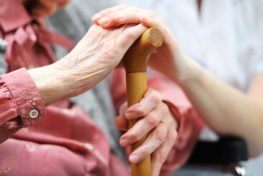What is Nursing Home Abuse?

Providing Comprehensive Information for Seniors and Their Families
When our elderly loved ones are mistreated by those families have entrusted to provide for their care and needs, the sense of betrayal and disillusionment can be devastating. Abuse of nursing home residents is especially upsetting because it involves vulnerable victims who may not have the ability to effectively comprehend, report or repel exploitation and abuse. Nursing home abuse can take many forms but generally involves the exploitation or mistreatment of seniors entrusted to residential care facilities. Because elderly nursing home residents may be completely dependent on caregivers in the facility for their most fundamental and basic necessities, residents are especially susceptible to abuse by overworked, underpaid and unqualified staff members.
Nursing Home Abuse Adversely Impacts Many Elderly Residents
The prevalence of elder abuse in nursing homes across the country is far more extensive than most families would assume without knowing the rather disquieting statistics disclosed by a study prepared by the Special Investigations Division of the House Government Reform Committee:
- One in three nursing homes was cited for abuse of elderly residents during the two-year period of the investigation.
- Approximated 5,233nursing homes were cited for more than 9,000 instances of resident abuse during the two-year study.
- More than 1,600 of these incidents of abuse resulted in actual harm, including “immediate jeopardy of death or serious injury.”
These alarming statistics are a cause for concern to any of us that are forced to entrust a nursing home with the care of our aging parents, grandparents, favorite aunts and uncles or other loved ones. However, aging baby boomers will soon increase the drain on financial resources available for the care of seniors so more families will face the challenge of selecting a safe nursing home for their loved ones and monitoring the care of elderly family members to verify that they are not being victimized by staff, medical providers, other residents or administrators.
A member of the MacArthur Foundation Research Network on an Aging Society, S. Jay Olshansky, PhD has explained the impending challenges this way, “As this generation of those ages 55 to 64 move into retirement within the next 10-15 years, they are going to experience levels of morbidity, disability and frailty that are higher than the generations that proceeded them into retirement because they live longer.”
Understanding the Most Prevalent Types of Elder Abuse in Nursing Homes
The types of nursing home abuse that are most typical include the following:
![]() Nursing home physical abuse may be defined as the intentional inappropriate use of physical force against an elderly nurse home resident that may result in bodily injury, pain or wrongful death. Physical abuse of an elderly resident is particularly offensive because seniors may be more fragile so they more easily suffer broken bones and fractures and may take much longer to recover from their injuries. While the severity of physical abuse can range from what might seem rather mild like a push or a slap to a beating or kicking incident, all forms of physical abuse are unacceptable and can result in significant harm to an elderly resident.
Nursing home physical abuse may be defined as the intentional inappropriate use of physical force against an elderly nurse home resident that may result in bodily injury, pain or wrongful death. Physical abuse of an elderly resident is particularly offensive because seniors may be more fragile so they more easily suffer broken bones and fractures and may take much longer to recover from their injuries. While the severity of physical abuse can range from what might seem rather mild like a push or a slap to a beating or kicking incident, all forms of physical abuse are unacceptable and can result in significant harm to an elderly resident.
Common acts of physical abuse inflicted on residents of nursing homes include but are not limited to the following:
- Pulling a senior’s hair or pinching the resident
- Unnecessary use of physical or chemical restraints
- Knocking a resident down
- Intentional deprivation of medication, nutrition, hydration or hygiene needs
- Punching, striking or beating the resident with a hand or object
- Slapping or kicking a resident
- Shoving the resident into a bed, wall or object to make the resident move faster
- Burning the resident’s skin
While this list of acts of physical mistreatment may seem appalling, these are actual examples of real physical abuse that occurs in nursing homes rather than a theoretical list of possible forms of unjustified physical mistreatment of nursing home residents.
While this may be the most distasteful and unimaginable form of nursing home abuse, it is an unfortunate reality in nursing homes across the U.S. Sexual abuse in a nursing home involves non consensual sexual interaction or conduct. Any sexual interaction between nursing home staff and residents is inherently problematic because the staff may exercise power, authority and dominance over residents who are frail, ill or otherwise lack the capacity to consent. Some common forms of sexual abuse in nursing homes include:
- Rape
- Sexual assault
- Sexual harassment
- Sodomy
- Fondling
- Forced exposure to pornography
- Sexual coercion
- Forced oral copulation
- Unwelcome or inappropriate touching
Although sexual abuse is one of the more horrific forms of elder abuse in nursing homes, it is also one of the most common. Some elderly nursing home residents are not in a position to offer resistance so they provide easy prey to sexual predators. Elderly residents may also have suffered a stroke or other medical disability that impairs their speech and physical mobility. When a resident’s ability to disclose sexual abuse or to physically repel an unwanted advance is limited, it creates an increased risk of sexual exploitation. Nursing home abuse may be perpetrated by staff that are not properly screened or supervised, other residents or visitors to a facility with inadequate security.













